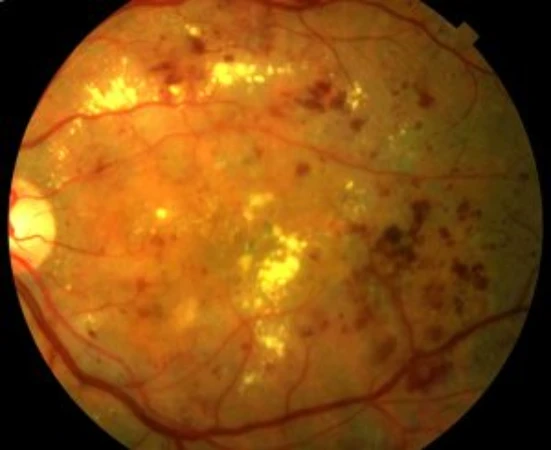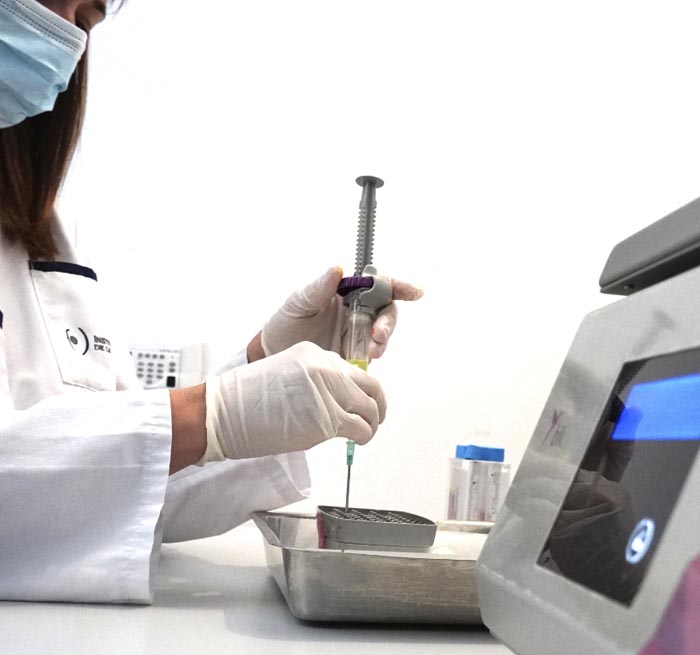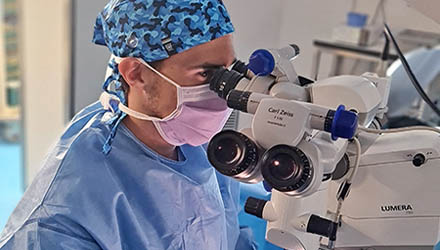The term epiretinal macular membrane refers to the development of abnormal tissue on the surface of the retina. This posterior contraction leads to a loss of the normal anatomy of the macula. It can affect healthy eyes and be related to vitreous detachment (the gelatinous substance that fills the inside of the eye). It can also form after events that cause ocular inflammation, such as surgeries or intraocular inflammatory and infectious diseases.
Pathologies and Treatments

Symptoms
The symptoms associated with the epiretinal macular membrane usually develop gradually. If the membrane contracts, it can distort vision or cause a central blur. Over time, the distortion worsens, leading to difficulty reading or making it hard for the affected eye to perform any task.
Treatments
Epiretinal macular membrane, epiretinal membrane. A complete ophthalmologic examination is essential, including the following tests: a retinography, autofluorescence, and optical coherence tomography. In some cases, fluorescein angiography is also necessary to rule out a possible associated pathology.
A relatively high percentage of epiretinal macular membranes tend to stabilize, and if the symptoms at the time of stabilization do not bother the patient or do not reduce their quality of life, they can continue to be monitored without the need for surgery.
In patients in whom the epiretinal macular membrane continues to progress, significant distortion or vision loss may occur. In these cases, the treatment consists of a small-incision posterior vitrectomy, which involves removing the vitreous humor and dissecting the membrane causing the traction, thereby releasing the underlying retina and allowing it to relax and function properly. The surgery is performed under local anesthesia, so the patient returns home after the procedure.
During the months following surgery, vision gradually improves in 80% of patients. However, in cases where the membrane causes significant traction and major deformation of the retinal tissue, visual recovery may remain limited. The Institut de la Màcula has the most advanced technology to diagnose and treat the epiretinal macular membrane. The latest technological advances, both in visualization and in vitreoretinal microsurgery instrumentation, allow us to approach the treatment of the epiretinal membrane with the highest guarantees of success.
Medicina regenerativa: Endoret
Con el tratamiento de medicina regenerativa Endoret propiciamos la reparación de la superficie ocular afectada por la sequedad ocular. Se trata de un plasma rico en factores de crecimiento para el tratamiento de las lesiones de la superficie ocular elaborado a partir de la sangre del mismo paciente. Con esta formulación individualizada se consigue una tolerancia completa y una efectividad óptima. Esta opción terapéutica revolucionaria es muy eficaz en casos de defectos epiteliales persistentes o úlceras corneales. Asimismo se puede aplicar después de una cirugía refractiva corneal, una cirugía ocular o en el Síndrome de Sjögren.
Procedures
Medicina regenerativa: Endoret
Con el tratamiento de medicina regenerativa Endoret propiciamos la reparación de la superficie ocular afectada por la sequedad ocular. Se trata de un plasma rico en factores de crecimiento para el tratamiento de las lesiones de la superficie ocular elaborado a partir de la sangre del mismo paciente. Con esta formulación individualizada se consigue una tolerancia completa y una efectividad óptima. Esta opción terapéutica revolucionaria es muy eficaz en casos de defectos epiteliales persistentes o úlceras corneales. Asimismo se puede aplicar después de una cirugía refractiva corneal, una cirugía ocular o en el Síndrome de Sjögren.
Dr. Jordi Monés,
M.D. PhD
Número de Col·legiat COMB: 22.838
Director. Doctor of Medicine and Surgery. Specialist in Ophthalmology. Specialist in Retina, Macula, and Vitreous.
If you found this interesting, feel free to share it here:
Last modified: 26/08/2025


